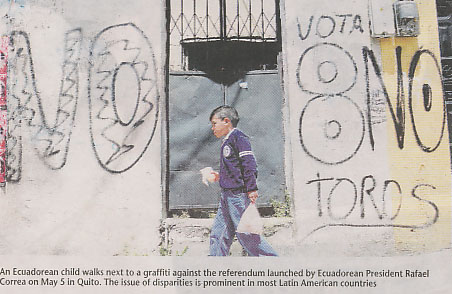Universities lost in a world of their own
THE university is a space to discover, share and learn a set of values while analysing the deeper meaning of its functions, one of which is its "service to society" role.
There is an urgent need for tertiary education institutions to be engaged with society, locally and globally, as part of their core mission as most participants at the recent Conference on Social Commitment, Spirit and Values of Universities recognised.
The event, which was held in the Andean mountains of Ecuador, aims to promote — in the widest and most universal sense of the definition — "social commitment, spirit and values" as a major theme of university life.
I was privileged to be the sole speaker from Asia at the seminar, which was attended by participants from 13 countries, largely of the Americas and Europe. I spoke on the theme Vision and Leadership in University Management. It was a chance to share the idea of insaniversiti that was expounded earlier this year as part of the Universiti Sains Malaysia (USM) Accelerated Programme for Excellence agenda.
While many recognise the need for higher education institutions to engage with society, the level of acknowledgement is too often found wanting. As a result, it places enormous threats against university education in particular and higher education, in general, as various tragedies unfold in the 21st century affecting generations across the globe.

Foremost is the issue of disparities, which is prominent in most Latin American countries. Even in Brazil, as part of the much touted Brazil, Russia, India and China communities, the issue was highlighted as one of the main concerns that could arise if it is not properly handled.
And universities may fail to act as the leveller of society via their education agenda that may promote disenfranchisement instead.
The critique is largely directed at "value less education" trapped in an agenda of elitism and exclusivity to a segment of population that is aloof and detached from "the deeper meaning of the functions of a university, which serve as guide in the application of its 'service to society' role".
Universities tend to be ethically irrelevant when "service to society" is geared towards an economic instrument to develop human capital. In fact, even the discussion of spiritual dimension is reduced to so-called "spiritual capital" — whatever that entails! Clearly, humanity is not part and parcel of the value chain as it is.
What is apparent is that universities in the 21st century will increasingly be "dehumanised" as an industry that cares more about the "tangible" benefits based purely on technological asset values and assessment.
The president of the host university — Universidad Tecnica Particular de Loja — in his welcoming address set the tone for the seminar when he said "let's not sell yourself cheap just to get results".
Perhaps what is most encouraging about the conference is Universidad Tecnica Particular de Loja is a private technical university in Loja, an hour's flight from the capital city, Quito. Located in the Andean mountains in the south of Ecuador, Loja is a proud province with many illustrious writers, musicians and poets, as well as persons of letters. It is better known as the "cradle of artists and intellectuals".
Loja is noticeably different in that it is community-engaged. The most important indigenous community located in the south of the country — Saraguro — has kept its traditions and ancestral culture alive until today. Saraguro has turned into an indigenous centre of customs, dress and arts and craft, with its Inca ruins very much intact and famous festivals still celebrated.
Indeed, the province is also home to a community of one of the longest living people in the world. In the valley of Vilcabamba, prized for its mild climate and "waters of eternal youth", the society is treasured for its level of "being amid a modest capital" development. It attracts the attention of many around the world who come to sample a life that many regard as "utopian" in this day and age.
This says nothing about the fertile wet forests with the highest biodiversity in the world, also known as the "botanical garden of Ecuador", given its multitude of flora and fauna.
How long will all these last? This is the question that conference members are asking universities who are lost in a world of their own. Clearly, there must be a new higher education awakening.
*The writer is the Vice-Chancellor of Universiti Sains Malaysia. He can be contacted at vc@usm.my
